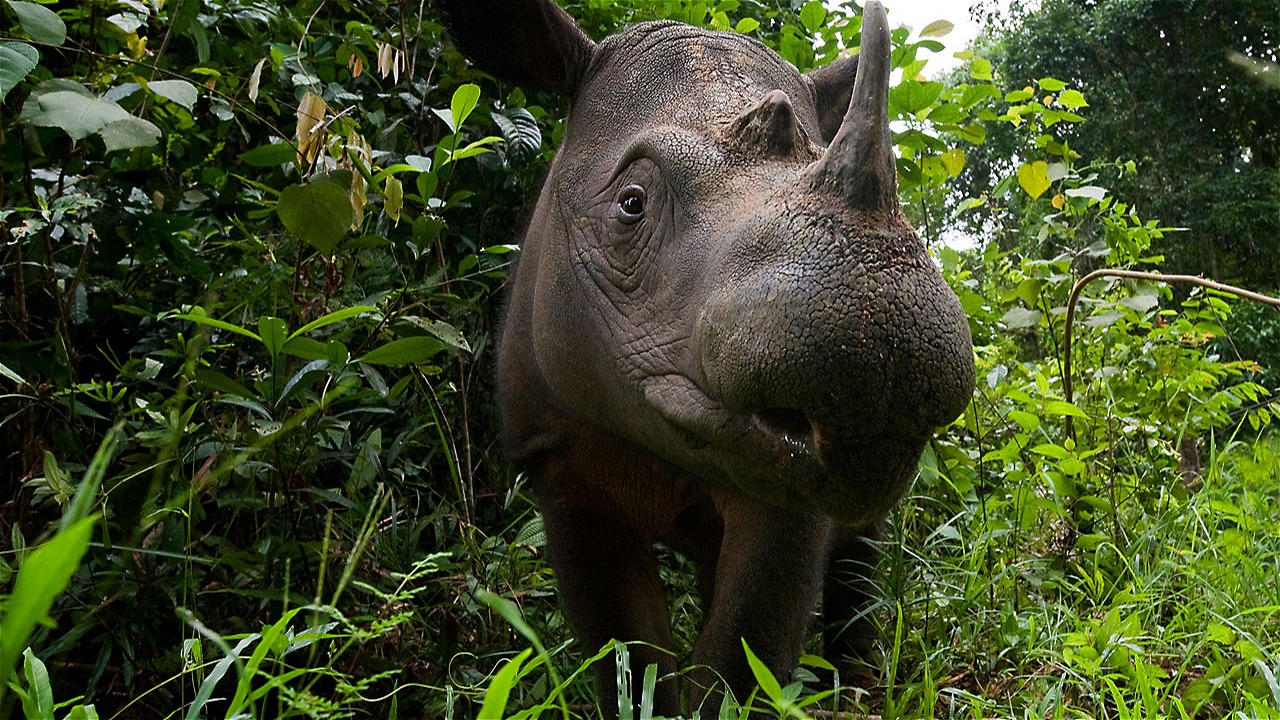SUMATRAN RHINO, THE INCREASINGLY RARE HAIRLESS RHINO
The Sumatran rhino (Dicerorhinos sumatrensis) is characterized by its small body with dense stiff hair all over its body and two horns on its face. One of the Asian rhino species is claimed to be the smallest rhino in the world and most closely related to ancient rhinos. The existence of this proud Indonesian animal is spread across the island of Sumatra, namely in the Leuser landscape, Bukit Barisan Selatan National Park (TNBBS), Way Kambas National Park (TNWK), and in one of the landscapes on the island of Kalimantan.
Although its existence is quite widespread compared to its sibling, the Javan Rhino (Rhinoceros sondaicus), its population numbers are more endangered. As reported by mongabay.com, WCS-IP estimates that the Sumatran Rhino population numbers less than 70 individuals. The IUCN has also assigned the critically endangered status (one step towards extinction) to this hairy rhino since 1996.
IUCN noted that there are two things that are the main threats to the sustainability of the Sumatran Rhino, namely poaching and the reduced ability to reproduce. Poaching occurs because there is still a lot of demand for rhino horns and body parts which are considered to have medicinal properties. Although the amount of poaching is not as high as tigers or elephants in Sumatra, illegal practices are still found. This was proven by the arrest of a protected wildlife trader in July 2017 in South Aceh. In fact, hunting a Sumatran rhino takes quite a long time for hunters due to the solitary and very shy nature of rhinos. However, the selling price of the horn, which can reach 50,000 Euros on the black market, makes it worth it for poachers. In addition, the threat of clearing forest land into plantations, mining or settlements also has an impact on the sustainability of the Sumatran Rhino.
Not only poaching or habitat destruction, the difficulty of breeding for Sumatran Rhinos is also a threat that is no less worrying for the preservation of this charismatic animal. In overcoming this, Yuyun Kurniawan, Rhino Coordinator of WWF-Indonesia said that reproductive intervention is needed to help rhinos breed. In addition, due to the solitary, elusive and secretive nature of rhinos, mating is difficult. Therefore, there needs to be an effort from humans to help their breeding. One of the suggested ways is reproduction through IVF. This method has proven to be effective enough to save rhinos because something similar has previously been done to White Rhinos in Africa.
Seeing that the efforts to save the Sumatran Rhino are quite complex, it certainly requires the role of all parties, starting from the government, law enforcement, conservation organizations, and all Indonesian people. The government in terms of rhino conservation has compiled and implemented the Rhino Conservation Strategy and Action Plan which took place from 2010 to 2017. Law enforcement agencies also play a role in preserving the Sumatran Rhino through a firm attitude in taking action against perpetrators of protected animal crimes, one of which is poaching of Sumatran Rhinos. Conservation organizations also play a role by conducting a series of awareness campaigns for the protection of Sumatran Rhinos.
Not only stakeholders who have the authority, the public can also actively participate in rhino rescue efforts. The easiest thing to do is not to become a consumer of rhino horn. Rhino horn is made of keratin, the same substance that forms human nails, whose efficacy has never been scientifically proven. That way, the demand for rhino horn can also be reduced and poaching activities can be reduced, even disappear. It should also be noted that the Sumatran rhino is also threatened due to the narrowing of habitat that occurs due to land conversion. Rhino habitats are converted from forests to oil palm plantations, mining, and become targets for encroachment. Therefore, we can also support Sumatran Rhino conservation efforts by being careful and wise consumers in choosing palm oil and forest products. By purchasing certified products, it means that you are participating in the efforts to conserve this large mammal that is the pride of Indonesia.





